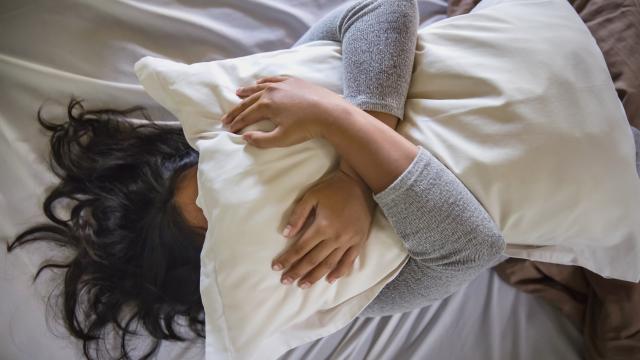As you may or may not know, World Sleep Day falls on March 17 (yes, the same day as St Patrick’s Day). And while a day dedicated to sleep may seem sort of unnecessary, it does stand as a reminder that sleep quality is pretty damn important – and it’s a great excuse for us to chat about how to improve on this aspect of our health.
Studies have long (and repeatedly) pointed to the suspected relationship between poor sleep quality and health conditions like obesity, type 2 diabetes, cardiovascular disease, mood disorders, dementia and more.
The Division of Sleep Medicine at Harvard University has shared that research indicates that sleep should be considered as important to health as nutrition and exercise.
In short, it’s a big deal. But, no matter how often we like to discuss the importance of sleep hygiene, when it comes to our nightly snooze, many of us are all too keen to sacrifice rest for another hour of Netflix.
I am fairly lucky when it comes to sleep. I can pass out almost anywhere, and I usually sleep through the night without trouble. (Yes, I am often reminded how annoying this trait of mine is.) However, despite my disgustingly easy relationship with sleep, I wake up every morning feeling like I have not rested – at all.
So, when I was offered an opportunity to sit down for a sleep consultation with the A.H Beard Sleep Wellness Centre, I jumped at the chance.
I sat down for a consultation with Rachel Beard, a Sleep Wellness Manager at A.H. Beard, and she gave me three pieces of advice. Here is what she had to say.
3 habits that should improve your sleep quality
Beard explained that, as we all kind of know, the rules of sleep are fairly simple. But irrespective of how simple these rules may be, they are difficult to remain consistent with.
It’s worth nothing that the advice Beard gave was tailored to me and my daily habits – but they’re pretty applicable to most people – so, they’re worth considering if you’re having trouble with your sleep routine.
Stop screen time one hour before bed
I told you these were simple. We all know that screen time has a negative impact on your sleep. The light exposure spells trouble for your body’s ability to properly rest. Studies have suggested this connection for a while now.
And yet, watching TV right up until bedtime, or staying glued to your phone until you close your eyes, is incredibly common. Beard highlighted that stepping away from your screen is not always going to happen, but if you can set a reminder for yourself each night, you can start to work towards breaking the habit. Try and swap it out for an hour of reading instead.
She also suggested using a red light (believed to be good for sleep) while using a screen as a means of ~sort of~ balancing out the impact of the blue light.
Avoid caffeine after 2:00 pm
Okay, so I am someone who likes to drink coffee all day – right up to after dinner. It’s something I grew up with, and I’ve always been able to fall asleep afterwards. But! Beard highlighted that while I may be able to fall asleep, the caffeine may be impacting the quality of my snooze.
By giving me a 2:00 pm deadline for coffee consumption, Beard believed I could give my body a chance to get the caffeine out of my body by bedtime.
Seperate your WFH set up from your sleep space
I keep my desk in my bedroom – next to my bed, in fact. That’s because I don’t have a home office and there is no other space available to me. It’s a relatively common thing for people who work from home.
But Beard, and other sleep experts, highlight that your bedroom (and bed) should only be used for sleep, sex and for when you’re sick. If you bring your work into this place of rest, you can may to make associations between your bedroom and work – or whatever else – and that’s not good for your sleep quality.
The BBC recently spoke with Rachel Salas, associate professor of neurology and sleep expert at Johns Hopkins University in Maryland, who shared that:
“The more you watch TV in bed, play video games in bed and not sleep in bed, your brain starts learning, ‘Oh, OK, we can do any one of these activities in bed’. It starts building these associations, which eventually evolve into conditioned behaviours.”
Now I don’t work from my bed, but having my desk next to my bed could have a similar impact.
So, what have I changed?
Following my chat with Beard, I almost immediately stopped drinking coffee after 2:00 pm. I have broken this rule a few times, but on most days I stop after lunch now and it hasn’t been as tough as I expected.
I am also looking into buying a room divider to hide my desk away when its time for sleep.
But the thing that has had the biggest impact for me, I think, is the no screen rule. When I listen to my reminders and turn off the screen, I spend the hour before bed showering, doing my skincare routine and reading – and I always sleep better when I do this.
But, and this is a big but, I also ignore my reminders a lot of the time. My greedy night brain always wants one more hour of screen time, and it’s a habit I am struggling to break. So, yeah. While I have seen some improvements, it’s very much a work in progress.

Leave a Reply
You must be logged in to post a comment.